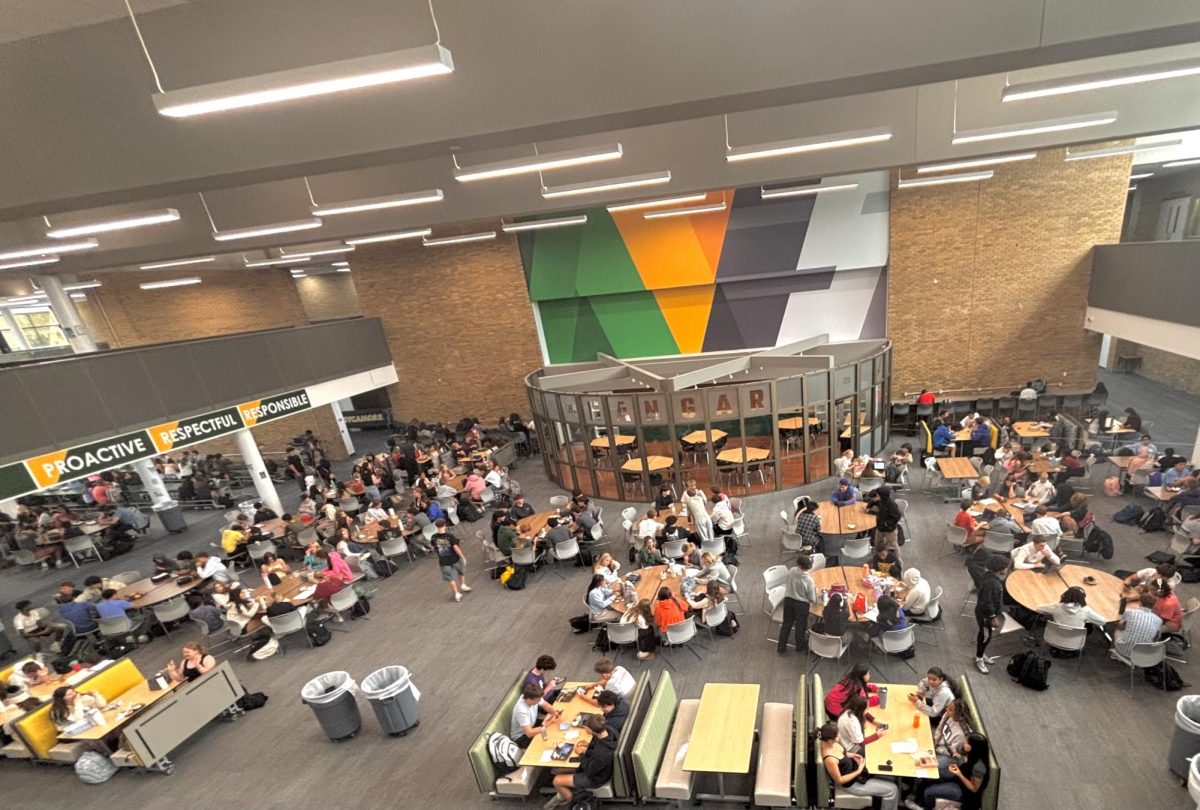The 2012 American Idol season featured a 15-year-old from Milford, Ohio, who became the youngest to ever make it into the top male 12.

Photo courtesy of Julie Swart.
This performer, Eben Franckewitz, came home to begin singing locally, eventually settling with two backup dancers. In concerts and on Youtube during 2013, SHS could find one of their own, Michelle Swart, 10, as one of those dancers.
Her journey began not at an audition or interview, but a hip hop class taught by Cameron Cumbee, Franckewitz’s choreographer.
“After I had stopped doing the class, Cumbee had found a video of me from when he had taped a dance that my friend and I had made up. He asked me to dance for Franckewitz,” said Swart.
Thus Swart, only 14 at the time, entered into the world of backup dancing for, at the time, a stranger.
“I didn’t know Franckewitz very well the first time we performed together. We didn’t even speak at all during the first concert because I was hanging out with the other backup dancers,” said Swart.
Backup dancing in and of itself was a very different experience from “regular dance,” she says.
“When it comes to normal dancing, you are making yourself look good, so it involves a lot harder skills. With backup dancing, it’s all about making your performer look good, so it is generally easier,” said Swart.
Though it may be easier physically, she found that emotional effort balanced the two arts.
“When we went on stage, we had to be energetic every single time. Otherwise, people got bored. We had to have the stamina to get through the dances and bring energy,” said Swart.
“We also had to have the stamina to stay awake when we were sleep deprived.”
Swart discovered the truth in this statement both from intense rehearsals in the weeks preceding performances and the obstacles of traveling to each concert. Her longest trip was to Houston, Texas: a 15-hour trek.
That trip took place over the course of one night. Swart drove with Cumbee, while Franckewitz rode with his mother and another group, Round Two Crew.
“I remember waking up to music blaring and the windows down. Cumbee tapped his hands on the steering wheel, bobbed his head up and down to music, called the manager- anything he could to stay awake,” said Swart.
Upon finally arriving at their hotel, they found that they had arrived three hours early to get into a hotel room.
After a walk to get food from a local bakery, Swart remembers walking into the lobby to find Cumbee asleep face-first on the floor.
“That’s just what we had to deal with,” said Swart.
In regards to the performance itself, the three performers had already developed a pre-show routine.
“We would get into a circle and pray right before we got on stage. After the prayer, Franckewitz usually went on stage before us. Cumbee and I would get each other hyped, and then we were ready to go,” said Swart.
Experiences like these gave her opportunities to develop relationships with her co-workers, especially with the Franckewitz family and Cumbee she says.
“It wasn’t like I performed with them and then went off into my little corner. I had to stay with them. We were inseparable because we had to like each other in order to get through the performances,” said Swart.
“We ended up liking each other anyway. I can say that I was literally best friends with them. So many people have asked me, ‘Do you hang out with him [Franckewitz]?’ I practically lived with him. He is my brother.”
Performances stopped for Swart in November of 2013 due to a number of reasons, one of them being Frankewitz’s increased focus on his dream of getting signed to a major company. Swart did not see him for nearly six months.
In March of 2014, Franckewitz was signed with Tim Coons, founder and CEO of Atlanta Hill Music and original producer of the Backstreet Boys, into a boy band, Far Young. Swart received word of it later that month.
“I was so excited to hear the news. I’ve seen him perform, and I know that he is an awesome performer. To see that, you want your performer to get signed,” said Swart.
Though it was Franckewitz’s dream, it also meant that Swart’s journey was coming to an end.
“I had known for a while that something was going to happen. When I heard I wasn’t going to perform with him anymore, I didn’t really feel anything. I just thought, ‘I’m going to have to say goodbye’,” said Swart.
So say goodbye she did.
“It was definitely bittersweet. I got to see everyone again. They told me, ‘We are always going to remember you. You are a part of the team. It’s going to be okay’,” said Swart.
She has had to return to her life of “regular dancing,” though she does not find that disappointing.
“It’s been a process, but I have to go on with my life. I’ve been doing that for the past six months. I have to go back to focusing on dancing and what I want to do,” said Swart.
When asked what she specifically wanted to do, “dance” was the quick answer. Backup dancing, however, does not fit into that dream.
“Backup dancing was a complete surprise for me that I was willing to do, but that’s not the world of dance. I want to be a part of the world of dance,” said Swart.
“I want to become a professional contemporary dancer, and then become a choreographer that is well-known, because then I get to bring my own style into dances.”







